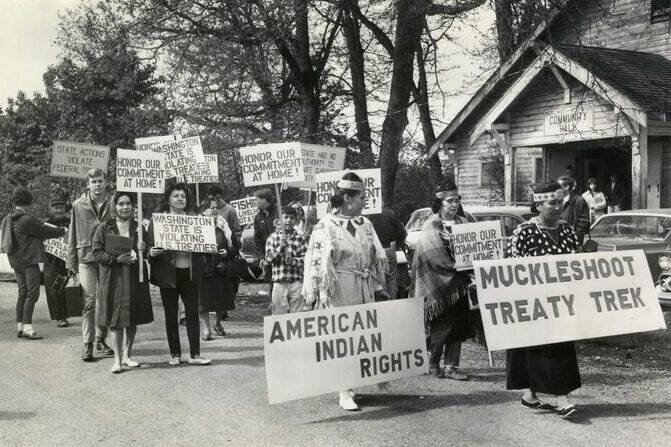The name Muckleshoot only came on the scene after 1857.
According to the Muckleshoot website: “The Tribe’s name is derived from the native name for the prairie on which the Muckleshoot Reservation was established. Following the Reservation’s establishment in 1857, the Tribe and its members came to be known as Muckleshoot, rather than by the historic tribal names of their Duwamish and Upper Puyallup ancestors. “
These tribes lived on Puget Sound for thousands of years, fishing, hunting, and gathering plants. Based upon the writing of white pioneer Ezra Meeker, who came to Puget Sound (the Salish Sea) about 1855, there were enormous runs of salmon, and abundant clams to eat. The term “clam bake” came from these peoples.
During the winters, the village group lived close to the rivers and the Sound relying on stored foodstuffs and local resources. Villages extended to the western Puget Sound. During the summers they would migrate inland to find food. Intermarriage was common among the various tribes and even extended to east of the Cascades.
As with most Native American tribes across North America, land was held in common. The concept of private property was a white concept brought over from Europe. These two concepts of land ownership would cause clashes and wars between Native Americans and whites throughout the 18th and 19th centuries.
In 1854-55, territorial Governor Isaac Stevens negotiated two treaties with what were then known as the Duwamish in the treaties of Medicine Creek and Point Elliot. In these treaties, the Duwamish, which included those living around Lake Washington, ceded their claims to the land in return for small reservations and the right to continue to “fish, hunt and gather the resources upon which they depended at off reservation locations.”
Governor Stevens considered the Native Americans as inferior and uncivilized compared to the whites. His actions and attitudes were the direct cause of the Indian War between 1855-1856 and the senseless deaths of both whites and the indigenous peoples. Some tribes rebelled while others were interned. In 1856, hostilities had diminished to the point where the two parties, including representatives of the Nisqually, the Puyallup, and the White and Green River Indians, met on Fox Island. Stevens made this agreement: to “I will give [you] land between White & Green rivers & I will send a man with you to mark out the ground so that you may be satisfied.”
Unfortunately, what Stevens promised was not put in writing. In February of 1868 the U.S. Secretary of the Interior brought an executive order to President Andrew Johnson that would have guaranteed all the land between the White and Green Rivers as part of the Muckleshoot Tribe. Johnson never signed the order due to the chaos created by his impeachment.
In the late 19th century, the U.S. government policy toward native Americans was to break up tribal communal land holdings and to sell the “surplus” land to non-Indians. Due to poverty and discrimination, much of the Muckleshoot lands were sold to non-Indians. In spite of these hardships the Muckleshoots were able to maintain their culture during these trying times.
In 1936, the Muckleshoots created their own constitution which was approved by the U.S. Secretary of the Interior.
During the 1960s, they allied with the Puyallups and Nisquallys and sued the U.S. government to retain their treaty rights to their traditional fishing areas. It took them until 1974 to win their victory in the famous Boldt decision which gave the Tribes who had signed the Stevens’ treaties the rights to 50% of the fish available.
This decision allowed the Western Washington tribes to prosper. Beginning the 1990s, the Muckleshoots introduced bingo and casino gaming onto the Reservation. With their increased income they set up Muckleshoot Seafood Products, the Muckleshoot Mini Mart, the Salish Tree Farm, the White River Ampitheatre, the Salish Lodge, and Emerald Downs.
They also purchased former reservation land from whites, and in 2013 acquired 96,307 acres of forest in King, Pierce and Lewis counties at a cost of just over $313 million.
The Muckleshoot Tribe has been very generous with grants to the local communities and governments. Their emphasis of living in harmony with nature rather than conquering and subduing it has offered a much-needed counterpoint to unregulated capitalism.


